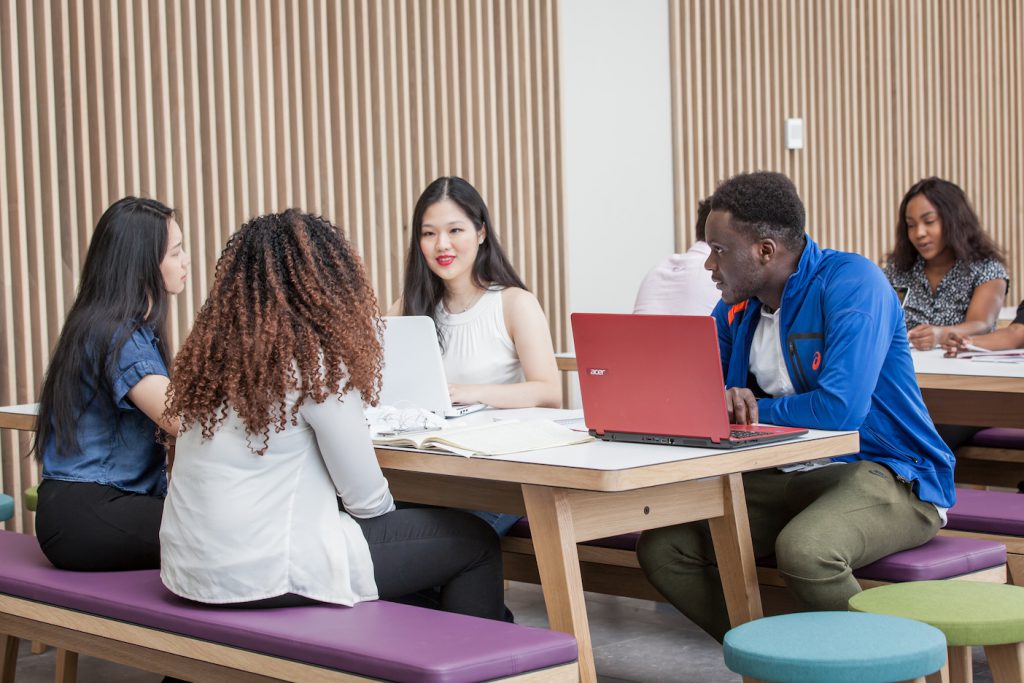Co-creation of education fosters a more democratic education system. It sits within a wider set of values about the role that education plays in society. Co-creation provides opportunities for students to develop their education on an equitable footing with academics and teachers; rather than merely to receive knowledge passively.
To embed co-creation and meaningful student engagement at a course, institutional and whole sector level is to begin to flatten the structures which disseminate knowledge – and in turn break down the gatekeeping of knowledge. This begins a process of redistributing power throughout the academy and fostering more innovative teaching approaches. By redistributing this power, we begin to break down the barriers to accessing education and to value learning as a community practice to which everyone can make a valid contribution.
This is increasingly being recognised by universities to different degrees. In many institutions, it is common for students to present their reading, or an aspect of their own research or practice as part of a class, or to set the direction of discussion. This values the knowledge being produced by the student and fosters the sharing of technical skills such as presentation and argument, and of applying knowledge and responding to a room. The two case studies below from UWE Bristol and Sheffield Hallam University provide examples of co-creation within universities with a professional and technical focus.
The ability to bring students into co-creation is a skill in itself, and should be valued as an integral part of good teaching. Innovative teaching practice should be promoted and shared, and students must be a part of valuing this. On a concrete level, academics and staff at all levels should be given the time to develop their practice as educators as well as their careers as researchers and developers – and given the funding to do so.
An effective teacher should be able to respond to a room and take discussion in new directions in response to a students’ chains of thoughts. This requires a willingness to learn and to be challenged. This environment of challenge can be fostered by leaving behind the idea that contribution is weighted heavily and that co-creation is coded in the values of assessment, as it currently is when students are only asked to present in return for a portion of their mark.
The ability to bring students into co-creation is a skill in itself, and should be valued as an integral part of good teaching
The current political focus on teaching excellence provides an opportunity to interrogate what excellent teaching actually looks like, and the values behind it. There is an opportunity to break away from the traditional format of lecturer-student across all sectors, but this must be underpinned by support for teaching staff. Any initiative which expects to foster excellent teaching through metrics and a focus only on competition will be at best superficial and at worst very damaging to innovative teaching in the education system. Such focus must also not favour non-innovative teaching in the name of upholding the position of elite institutions on the merit of their reputation rather than their practice.
This is a challenge for the education sector. Embed co-creation in your learning environments and allow yourselves to be challenged by it and by the results. The process of redistributing power throughout an institution will by necessity be an uncomfortable process, however the rewards will be reaped for society as a whole.
Case study: Team Entrepreneurship at UWE Bristol

Image: UWE Bristol @tom_sparey
Bristol Business School’s Team Entrepreneurship programme is one of the first business degrees to embrace the innovative ‘Tiimiakatemia’ model in the UK. Pioneered in Finland, the model avoids traditional classroom formats.
Instead, students launch their own business ventures. They work in a dedicated office environment within ‘team companies’ supported by a ‘team coach’. Learning is built around three clear strands which combine to develop knowledge, skills and mindset:
- Individual strand: students use self-managed learning principles to complete their own programme of development and learning, completing a personal learning contract they agree with their team companies (rationale: entrepreneurs need to manage their own learning).
- Team strand: students develop leadership, followership and collaborative skills within team-based projects and ventures (rationale: entrepreneurs need to work with others). Each team company has its own open plan office space in the dedicated Team Entrepreneurship Hub.
- Venture strand: students launch and run their own businesses and social enterprises (rationale: entrepreneurs need to create organisations that generate value).
Assessment focusses on enabling students to evidence learning from their engagement in practice (learning by doing). Assignments include the requirement for active engagement with external businesses and project teams address real business problems.
Each week students engage in ‘creative conversations’ with external employers and entrepreneurs, including amongst the alumni network. In some cases this has led to longer-term mentoring for the students. Businesses being run by graduates of the programme include Crowdreach, an agency which helps entrepreneurs raise capital through crowdfunding and Unique Insights, which offers universities sophisticated analytical software to help them reduce undergraduate drop-out rates.
The first cohort of students graduated in July 2016. DLHE and NSS data shows high levels of attainment and satisfaction, with 100% of graduates saying that the programme prepared them well for starting their own business. Graduates not running their own companies are also proving to be highly employable within professional and managerial roles. The programme is developed by the active involvement of its students including through the requirements of the final year project which requires their input to the future of the programme.
This essay has been extracted from our publication, Technical and Professional Excellence: Perspectives on learning and teaching.




